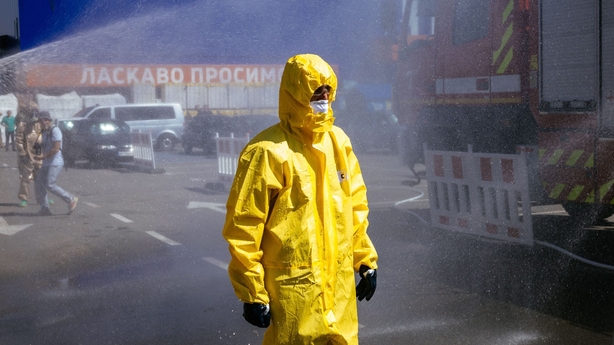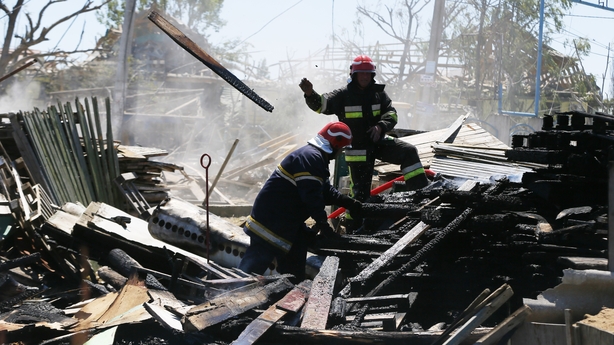Public celebrations have been banned in Ukraine's capital Kyiv this week to commemorate independence from Russian-dominated Soviet rule, local authorities said.
A curfew has also been declared in Ukraine's second city, Kharkiv, due to a heightened threat of Russian attack.
Near frontlines in the south of the country, Ukraine said Russia fired rockets into several southern Ukrainian towns north and west of Europe's largest nuclear power plant, captured by Russian forces shortly after they invaded Ukraine in February.
Artillery and rocket fire in the region of the Zaporizhzhia nuclear reactor complex, on the Russian-occupied south bank of the Dnipro River, has stirred fears of a nuclear disaster and led to calls for the surrounding area to be demilitarised.
On February 24, Russia began what it refers to as a "special military operation" to demilitarise its smaller neighbour and defend Russian-speaking areas.
Russia is charged with pursuing an imperial-style war of conquest by Ukraine and its Western sponsors.
Prior to this Wednesday's celebration of Ukraine's 31st anniversary of independence from Soviet authority, Ukrainian President Volodymyr Zelensky issued a warning over the weekend about the possibility of additional, more violent attacks.
According to a document released by the Kyiv military administration and signed by its leader Mykola Zhyrnov, large public events, demonstrations, and other gatherings related to the anniversary are prohibited in the city until Thursday owing to the threat of rocket strikes.
The normal evening curfew has been extended by Ihor Terekhov, the mayor of Kharkiv in the northeast, which has been subject to frequent and fatal long-range Russian bombing, to run from 4pm to 7am starting tomorrow through Thursday.
Regional governor Vitaly Kim said officials were preparing a precautionary order for citizens to work from home tomorrow and Wednesday and advised people not to gather in big numbers. This was mentioned in the port city of Mykolaiv, which is close to Russian-occupied territory to the south.
In his nightly video address on Saturday, Mr. Zelensky warned that in the days leading up to Wednesday, which also happens to be the halfway point since Russia's invasion, Moscow might try "something particularly ugly."
He asserted to have notified other international leaders, including UN Secretary-General Antonio Guterres and Turkish President Tayyip Erdogan, and to have addressed "all the risks" with his French counterpart.
All of Ukraine's partners have been informed of what the terrorist state can plan for this week, Mr. Zelensky said in his nightly video message. He made a reference to Russia.
The Financial Times reported Monday that Gennady Gatilov, the Russian ambassador to the UN in Geneva, claimed that Mr. Erdogan had attempted to promote communication.
He did, however, refute reports that Vladimir Putin and Mr. Zelensky had discussed meeting, telling the newspaper that there was no "practical basis for doing so."
In recent weeks, there have been numerous instances of shelling in and near the Zaporizhzhia nuclear reactor complex, which is located on the south bank of the Dnipro River that is seized by Russia.
Moscow has been charged by Kyiv with stationing troops and stockpiling military hardware on the grounds of the power plant and using it as a launching pad for attacks on areas to the west and north that are governed by the Ukrainian government.
Russia disputes this and claims that Ukraine has been using drones and mortars to attack the plant.
According to regional governor Valentyn Reznichenko's Telegram post, Russian forces fired rockets into Nikopol, which is located directly across the Dnipro from the plant on its south bank, as well as the farther-flung Krivyi Rih and Synelnykovskyi neighbourhoods in the northwest and northeast, respectively.
In addition, Ukraine said that Russia had launched a missile attack on Voznesensk, which is southwest of the nation's second-largest nuclear power plant.
In a phone discussion yesterday, Mr. Macron, German Chancellor Olaf Scholz, British Prime Minister Boris Johnson, and US President Joe Biden emphasised the significance of protecting the safety and security of Ukraine's nuclear plants.
A recent expedition by the UN nuclear watchdog agency to Zaporizhzhia was welcomed, and they reaffirmed their "steadfast determination" to stand by Ukraine in the face of a Russian invasion.
The battle, which is the largest to affect Europe since World War II, has wrecked towns and cities, claimed thousands of lives, and driven millions of people from their homes.
The fighting has been centred in the east and south where frontlines have remained virtually stagnant for weeks since Ukraine successfully resisted a Russian assault to capture Kyiv early in the conflict.
The General Staff of Ukraine said that Russian forces had made small but steady gains toward Mykolaiv in the Blahodnatne region in its morning update.
Along with the nearby Luhansk city that Moscow's forces earlier in the summer took, Pisky, Bakhmut, and Kramatorsk are important cities in the Donetsk province and together with them make up the eastern Donbas region. Russia was also attempting to regain momentum in these directions.
According to an update from the Ukrainian military leadership, Russian artillery and several rocket launcher systems bombarded the regions of Soledar, Zaytseve, and Bilohorivka nea rBakhmut.
The local government said that at least two citizens died. Russian officials deny targeting civilians.
Authorities in Russia are looking into a possible vehicle bombing outside of Moscow that claimed the life of Alexander Dugin's daughter. Dugin is an ultranationalist who favours Russia swallowing Ukraine.
When it came to determining who was to blame, investigators stated that they were considering "all theories," although the Russian Foreign Ministry suggested there might be a connection to Ukraine, which a Zelensky adviser rejected.
Mykhailo Podolyak stated on Ukrainian TV that "Ukraine, of course, had nothing to do with this since we are not a criminal state, like the Russian Federation, and also we are not a terrorist state."
Authorities in Russia are looking into a possible car bomb attack that killed the daughter of ultra-nationalist Alexander Dugin, who favours Russia swallowing Ukraine, outside of Moscow.
The Russian Foreign Ministry said there might be a connection to Ukraine, which a Zelensky advisor disputed, even though investigators stated they were evaluating "all possibilities" while determining who was to blame.
Mykhailo Podolyak claimed on Ukrainian TV that Ukraine has nothing to do with this because it is neither a terrorist or criminal state like the Russian Federation.






.png)
The opinions posted here do not belong to 🔰www.indiansdaily.com. The author is solely responsible for the opinions.
As per the IT policy of the Central Government, insults against an individual, community, religion or country, defamatory and inflammatory remarks, obscene and vulgar language are punishable offenses. Legal action will be taken for such expressions of opinion.